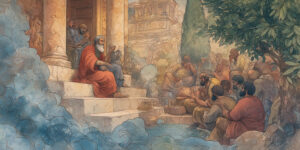
Guidelines
God gives Moses and Aaron very specific instructions about the Passover meal. Outsiders could not participate unless they fully entered into the covenant community…
In the sixth month of Elizabeth’s pregnancy, God sent the angel Gabriel to Nazareth, a town in Galilee, to a virgin pledged to be married to a man named Joseph, a descendant of David. The virgin’s name was Mary. The angel went to her and said, “Greetings, you who are highly favored! The Lord is with you.”
Mary was greatly troubled at his words and wondered what kind of greeting this might be. But the angel said to her, “Do not be afraid, Mary; you have found favor with God. You will conceive and give birth to a son, and you are to call him Jesus. He will be great and will be called the Son of the Most High. The Lord God will give him the throne of his father David, and he will reign over Jacob’s descendants forever; his kingdom will never end.”
“How will this be,” Mary asked the angel, “since I am a virgin?”
The angel answered, “The Holy Spirit will come on you, and the power of the Most High will overshadow you. So the holy one to be born will be called the Son of God.Luke 1:26-35
Let’s turn to the story of Mary in the Gospel of Luke — a story that begins with an extraordinary event that changed her life forever. When the angel appeared to Mary, it was both terrifying and awe-inspiring. The angel told her, “God has found favor with you,” a message that must have filled her with both immense joy and overwhelming responsibility. Mary knew her life was about to change in ways she could not fully comprehend, and the road ahead would be far from easy.
At this moment, Mary understood one thing clearly: she would become pregnant before she was married. In today’s world, this might not carry the same weight in many cultures, but in first-century Judaism, this was a grave matter. In fact, it was considered a capital offense. For Mary, a young teenager, this situation was unimaginably difficult. Her future seemed uncertain, her dreams of a traditional marriage to Joseph at risk of being destroyed.
The Cultural Context of Mary and Joseph’s Betrothal
Mary and Joseph were betrothed — a legally binding agreement akin to marriage, though they were not yet living together. In those times, families often arranged marriages long before the couple came of age. These arrangements were not based on romantic feelings but on practical considerations and family alliances. While this may seem foreign to modern cultures, it was the norm for much of human history, including in first-century Israel.
Betrothal carried significant weight. If Mary or Joseph had died during this period, the surviving partner would have been considered a widow or widower. Thus, Joseph’s discovery of Mary’s pregnancy was a serious matter. Initially, Joseph planned to quietly divorce her, in accordance with Jewish law, to avoid public disgrace or even her execution. However, God intervened through an angel, who assured Joseph that the child was conceived by the Holy Spirit. Joseph, a man of great character, obeyed God’s command and took Mary as his wife, protecting her and the child she carried.
The Misconceptions Surrounding Mary
Mary’s role in God’s plan has often been misunderstood, leading to traditions and doctrines that elevate her beyond the Biblical account. For example, the doctrine of the Immaculate Conception, which claims Mary was born without sin, was introduced to address theological questions about Jesus’ sinlessness. However, this teaching is not rooted in Scripture.
While Mary was an extraordinary individual, chosen by God for a pivotal role in salvation history, she was still human. Like all of us, she needed the saving grace of Jesus Christ. The Bible emphasizes that there is salvation in no one else but Jesus. Mary herself recognized her need for a Savior, as expressed in her song of praise (Luke 1:46-47).
Unfortunately, attempts to elevate Mary have sometimes led to practices that distract from the centrality of Jesus. The veneration of Mary, including the belief in her assumption into heaven and her role as a mediator, lacks biblical foundation. While honoring Mary as a role model of faith is appropriate, worship belongs to God alone.
The Danger of Detours in Faith
Human nature often seeks to simplify or explain the mysteries of God by creating traditions or assigning divine roles to people or objects. From the veneration of Mary to the adoration of objects bearing her likeness, these practices can lead believers away from the core message of the Gospel. Such detours are dangerous because they shift focus from Jesus, the true source of salvation.
As believers, we are called to approach God directly through Jesus. He is the one who invites us into a personal relationship with Him, offering forgiveness, grace, and eternal life. Mary, though an exceptional example of faith and obedience, cannot fulfill the role of a deity or mediator.
Conclusion: Trust in the Power of God
Mary’s story is a testament to the power of faith and trust in God’s plan, even in the face of fear and uncertainty. She exemplifies courage, humility, and unwavering devotion. However, it’s vital to remember that she points us to Jesus, not away from Him. Her life reminds us to trust in God’s promises, even when we don’t fully understand them.
As we reflect on Mary’s story, let us honor her as an example of faith while keeping our worship centered on Jesus, the King of the Universe. In Him alone, we find salvation, hope, and the abundant life that God promises.
8.12.2024

God gives Moses and Aaron very specific instructions about the Passover meal. Outsiders could not participate unless they fully entered into the covenant community…

People misunderstand the relationship between faith and works, pitting Paul and James against one another. But this is a false divide…

In Romans chapter 4, the Apostle Paul unpacks a profound theological truth centered on Abraham and the nature of faith…

Jesus delivers a story that holds profound truths about our relationship with God, the nature of repentance, and the character of our Heavenly Father…

The God who had spoken through burning bushes and mountain thunder now came to dwell within His people…

The Apostle Paul meets a group of twelve men in Ephesus—students of John the Baptist—who have not yet received the Holy Spirit. Their story teaches us something essential…

It’s easy to embrace Jesus as a baby in a manger. It’s also powerful to reflect on Jesus on the cross. Both images stir the heart…

The Ethiopian official was a treasurer in service to Candace, queen of the Ethiopians.
Yet Philip—prompted by the Spirit of God—approaches him. It must have taken courage…

In the Gospel of Luke, chapter 2, we find a rare glimpse into the childhood of Jesus. It’s the only story we have between His birth and the beginning of

Though spoken under the Old Covenant, the truths of Malachi still speak powerfully today. Because God hasn’t changed…